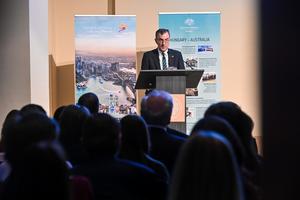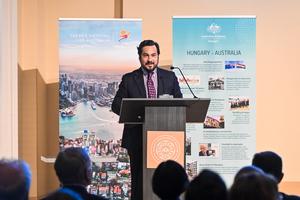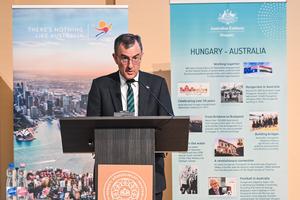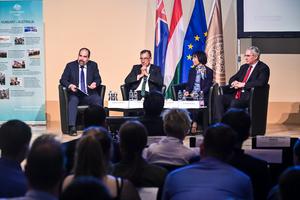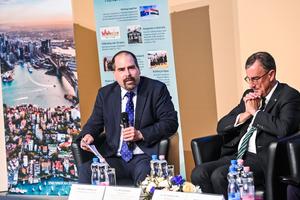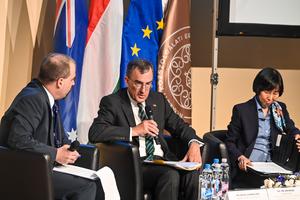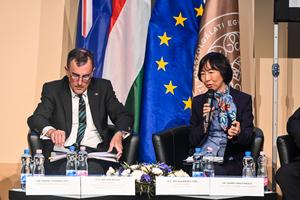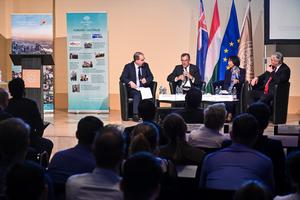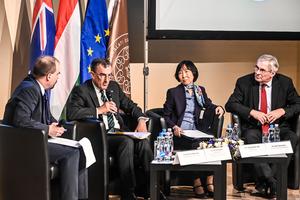The Ludovika University of Public Service's International Office and the Embassy of Australia jointly organized a lecture by Ambassador Ian Biggs on April 29th at the St. Ladislaus Chapel of the Ludovika Main Building. The next session of the Ludovika Ambassadorial Forum featured a panel discussion in which the Japanese Ambassador, Hikariko Ono, also participated.
At the beginning of the event, Annamária Kitta, Head of the International Office, welcomed the guests, and then Pier Paolo Pigozzi, the vice-rector for international affairsof LUPS, briefly introduced the speaker. It was stated that H. E. Ian Biggs has been Australia's ambassador to Austria, Bosnia and Herzegovina, Hungary, Slovenia, and the Slovak Republic since the spring of 2023. He represents his country at the International Atomic Energy Agency (IAEA) and serves as Australia's Permanent Representative to the United Nations. Previously, he worked as an ambassador to Iran, Turkey, and Saudi Arabia overseas, and as Deputy Head of Mission in India, Austria, and Syria. The vice-rector expressed his pleasure that H. E. Hikariko Ono, Japan's ambassador to Hungary, would also join the panel discussion alongside H. E. Ian Biggs. He said that LUPS plays an important role in maintaining international relations. As for the relationship between the Indo-Pacific region and our country, these are not new, dating back to the 18th century. Following the beginnings were friendly collaborations and the establishment of regular economic, trade, and cultural relations. The university also conducts strategic research on the region. Today is a great opportunity to get a more accurate picture of this distant region - concluded the international vice-rector.
Ian Biggs emphasized that the country's multicultural identity is the basis of its foreign policy, which revolves around values and priorities. "For Australia, there is no greater priority than the protection and maintenance of a peaceful, flourishing, and secure Indo-Pacific region, which enables cooperation, trade, and prosperity for all countries, asserting their national interests free from the coercion of major powers," he emphasized.
For his country, the preservation of pluralism and peace is of paramount importance in the face of the dynamic changes of our time. Among the challenges, he mentioned overpopulation, climate change, and the related challenges of global trade and the world economy. As the ambassador pointed out, the region is home to 65 percent of the world's population, accounting for 62 percent of global GDP, 46 percent of world trade, and 43 percent of global energy consumption. He said that countries in the remote region seek to contribute to the stability and development of the region through cooperation and strengthening of trade relations.
"I would like to emphasize that Australia's goal is to support a region based on accepted rules and international law," he stated. However, the ambassador also warned that there is currently unprecedented, non-transparent military activity unfolding in the region at a scale and pace not seen in nearly a century. This directly increases the risk of military escalation. Concerns arise from the increased tension in the Taiwan Strait, aggressive actions in the South China Sea, and the destabilizing effects of North Korea's ongoing nuclear weapons program and ballistic missile launches. He added that the desire for peace and stability is evident throughout the entire Indo-Pacific region, and history shows that great power competition can and should be managed responsibly.
He discussed Australia's international relations, emphasizing that they continue to strengthen their strategic partnerships with the United States alongside South Korea, Japan, and India. Based on their national defense strategy, they pay attention to the stability of the country. He also mentioned the role of the Quad (Quadrilateral Security Dialogue), formed through cooperation between the United States, Japan, India, and Australia, in this context.
In developing cooperation between the European and Indo-Pacific regions, the ambassador highlighted the following areas: maritime security; capacity building for fisheries management and legal training; cooperation on cyber security, countering disinformation attacks, and foreign interference; more high-level visits to the region, and opening more embassies in the distant region. He also emphasized the unparalleled economic opportunities offered by the region. Last but not least, it's worth considering that "diversifying trade and investment relations in the Indo-Pacific region opens up huge markets for businesses and consumers, while contributing to sustainable, fair, and inclusive economic growth in the Indo-Pacific region," emphasized Ambassador Biggs.
He highlighted investment opportunities in clean energy and sustainable technology, efforts to improve resilience to climate change, and stated that "Australia is a fantastic gateway for Hungarian businesses seeking access to Indo-Pacific markets." "I've heard some impressive success stories from Hungarian companies opening offices in Australia, while more and more Australian businesses are choosing Budapest as a hub for their European Union market ambitions. I hope that the conclusion of an ambitious Australia-EU Free Trade Agreement will facilitate support for such opportunities!" concluded the speaker.
Following the presentation, a panel discussion moderated by Endre Domaniczky, former Australian consul, took place, with the participation of Ian Biggs, the Australian Ambassador, Hikariko Ono, the Japanese Ambassador, and Tamás Magyarics, a historian and former Irish Ambassador, who is currently the Chief Researcher at LUPS' Institute for American Studies. The topic of the discussion was Australia and the surrounding South Pacific region or in a broader context: the Indo-Pacific region.
The participants discussed the position of Australia and Japan in the Pacific region. The former is politically closely linked to the United States and economically to China. Its difficulties partly stem from this situation, as the United States and China are now rivals in the Pacific region. The basis for maneuvering here lies in mutual respect and trust between great powers, as well as the defense of democratic values. Regarding Japan, Ambassador Hikariko Ono spoke about cooperation, investments, and shared values with Australia. "We are natural partners, allies," she added. Professor Tamás Magyarics, speaking about America, said that until World War II, the focus of overseas foreign policy thinking was on the Atlantic front, but during the decades of the Cold War, Europe demanded greater attention. Now, with the strengthening of China, the focus has returned to the Pacific region: the previous 50-50 percent attention ratio has shifted to 70-30 in favor of the distant region.
The discussion also touched on the possibilities for asserting the interests of individual states, the ambitions of Russia and China, close and typically fruitful regional cooperation, and the role of India. Regarding the latter topic, it was mentioned that Australia has built particularly successful economic relationships with the Asian country, marked by numerous high-level visits, agricultural and tourism cooperation. Japan also considers India an indispensable partner, with similarly good bilateral relations. Concerning the USA, Tamás Magyarics outlined several scenarios. Among these, the most desirable version would be strategic cooperation among the great powers, leading to joint responses and solutions to global challenges such as migration and climate change.
Text: Lilla Kovács
Photo: SzilágyiDénes
